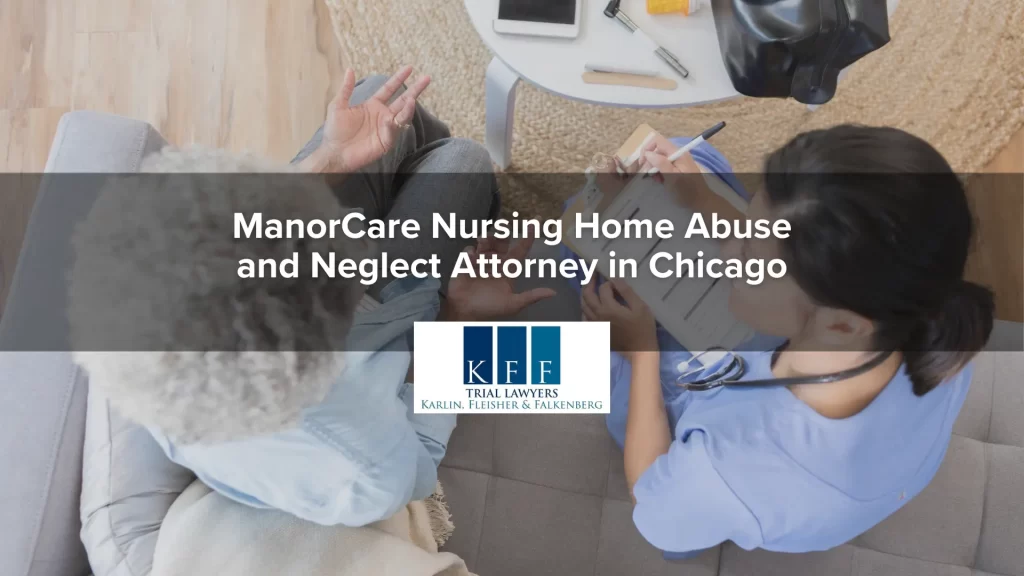
The decision to place a family member in a nursing home facility is hard. What may be even harder is finding a safe and healthy environment where they can thrive and get the care they need. You do your research and find a nursing home you trust, such as ManorCare Nursing Home. However, a beautiful website promises individualized care, and a commitment to quality may only be a nice veneer. You need assurances that underneath the pretty pictures and turns of phrase, your loved one is in safe and capable hands.
Unfortunately, abuse can happen anywhere. Statistics from the World Health Organization show that between 2017 and 2018, at least 1 in 6 adults over the age of 60 suffered some form of abuse while in a nursing home facility.
At Karlin, Fleisher & Falkenberg, LLC, we have attorneys with the experience and resources at their disposal to be able to investigate claims of ManorCare Nursing Home abuse. When you can’t be with your loved one as much as you’d like, you may only have scattered evidence or stories from your family members that point towards abuse. You may not know where to turn for solid answers. Rest assured, you can turn to us. Lay your fears at our feet and let us do the legwork to get to the truth. We care deeply about your family’s well-being. Call us at 312-346-8620 for a free consultation.
What is Nursing Home Abuse?
How do you define nursing home abuse? The term seems straightforward enough, but abuse can take many forms. The Nursing Home Abuse Center calls nursing home abuse any type of action or behavior that results in harm being caused to an elderly resident or patient. We may hear the word “abuse” and jump to thoughts of beatings and physical injuries, but that isn’t always the case when it comes to nursing home abuse cases. It is estimated that financial abuse costs the elderly close to $36 billion every year.
Types of Nursing Home Abuse
Before you can begin to unravel whether abuse is taking place, it is important to understand the different types of abuse that can occur in a nursing home setting. Again, not all abuse is physical. Abuse can leave marks on an older person’s pocketbook and scar their mental health. The lack of interaction itself can be a form of abuse. Neglect can cause just as much harm to the elderly as being hit.
While this list is not a comprehensive guide to all types of abuse, it is a good outline of the different forms that abuse can take and what you should look out for:
- Physical Abuse – Physical abuse is any type of physical contact that causes a resident bodily harm. Signs of this form of abuse may include unexplained cuts, bruises, broken bones, or burns.
- Sexual Abuse – Any type of unwanted touching, fondling, intercourse, or other sexual activity can be sexual abuse. A resident may vocally refuse to give consent, but in some circumstances, a powerful medication, or an inability to communicate, may prevent them from speaking up. This is still sexual abuse.
- Emotional Abuse – Emotional abuse takes place when caregivers yell, use verbal threats, and insults, intimidate, or humiliate elderly residents. Signs of this type of abuse can be more subtle and include depression, anxiety, changes in sleeping or eating habits, or a refusal to cooperate with certain staff.
- Financial Abuse – Some caregivers find the elderly easy prey and take advantage of them for their own financial gain. This can be classified as financial abuse. This type of abuse may result in theft of personal property, identity theft, scams, or coercing someone to offer up their bank account information or cash.
- Neglect – Sometimes, abuse means never laying a finger on a resident. The elderly can easily become victims of neglect, resulting in malnutrition, dehydration, sores, poor hygiene, and frequent illnesses. It may also cause complications to existing medical conditions if caregivers neglect a patient to the point where they are not administering needed medication.
Why Does Abuse Occur?
 One of the reasons we may overlook signs of abuse in nursing home settings is that we can’t wrap our minds around why or how a dedicated caregiver could stoop to such a horrific level. There are a variety of reasons that a nursing home may not be providing your loved one with the quality care they deserve, and you expect.
One of the reasons we may overlook signs of abuse in nursing home settings is that we can’t wrap our minds around why or how a dedicated caregiver could stoop to such a horrific level. There are a variety of reasons that a nursing home may not be providing your loved one with the quality care they deserve, and you expect.
Examining some of the more common motives for nursing home abuse may give you a better picture of the signs to be aware of if you are starting to suspect abuse may be taking place:
- Corporate Structure – In many cases, abuse stems from a corporate structure that holds profit above the health and safety of residents. Typically, nursing home facilities are for-profit entities, meaning they have to remain profitable to stay in business. A less than reputable corporation may decide to cut corners regarding staffing, maintenance, or training to increase profit margins.
- Understaffing – Caregiving is tough work, and burnout is real for many types of medical staff. Caregivers may come and go, but when a nursing home is understaffed, it intensifies the burden on existing staff. This can lead to caregivers losing their patience and lashing out at residents or becoming overwhelmed and lax in their duties, resulting in neglect.
- Poor Hiring Practices – Being understaffed is a huge problem, as is not properly vetting employees. Poor hiring and training practices can mean people without the right temperament or skills are expected to look after the elderly.
- Poor Pay or Work Environment – Caregivers who feel they aren’t being properly compensated may turn to scamming residents, stealing personal property, or threatening residents to give them money. They may also feel that if they are not being properly paid and looked after by their employer, why should they bother properly caring for the resident? A bad environment breeds resentment and possibly bad behavior.
Can Karlin, Fleisher & Falkenberg, LLC Help Me and My Family with a ManorCare Nursing Home Case?
Your loved ones didn’t work hard for their entire lives to end up being abused at the hands of a negligent caregiver at ManorCare Nursing Home. They deserve better, and you deserve peace of mind that your family is well cared for. We understand that without solid evidence, you may be reluctant to come forward with allegations of abuse.
At Karlin, Fleisher & Falkenberg, LLC, we want you to feel comfortable sharing your concerns, large or small. We offer compassionate legal support to help you and your family while aggressively investigating your concerns. Set up a free consultation by calling 312-346-8620 and get the legal advice you need now.
